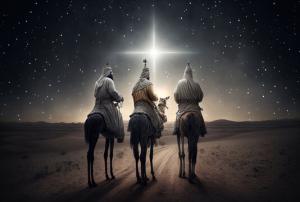
There are a few places I only go under duress. Hobby Lobby is one of them. I know its virtues, and I can’t completely explain my reaction to the place. But just feet within the entrance, I begin wondering how soon I can check out.
Late in September we made one of those runs to Hobby Lobby, and I was astounded to discover that you could shop for Halloween, Thanksgiving, and Christmas right after Labor Day. It made my stomach hurt. And because all three holidays are associated with events in the church’s calendar – in practice, if not in name – it also has a way of telescoping three months of ministry into one, really painful shopping trip.
It is probably because all three holidays have become target-rich environments for retailers, that we are left with the impression that the third of them, Christmas, is the big deal in the life of the church. And the vast majority of people, including most Christians, assume that Christmas is over and done on the 25th. Epiphany doesn’t even factor into the way people think about the Christian faith at all.
But the history of the church’s calendar is actually very different. Early on, in fact, the only festival that the church celebrated was Epiphany. There was no Christmas celebration at all. It wasn’t until the fourth century that parts of the church distinguished the two. And it wasn’t until the sixth century at the Council of Tours that the western church designated December the 25th as the date for Christmas, January 6th as the date for Epiphany, and the days in between as Christmastide. The Eastern Orthodox Church, on the other hand, never celebrated Christmas and it still doesn’t. It celebrates Epiphany instead, and they use the word, “Theophany”, a vision of God.
All of this is wildly out of sync with our cultural practices, and – frankly – it is reflected in church attendance, as well. So, what are we missing? What is Epiphany all about and why is it so important?
The basic elements of an answer to that question are beautifully outlined in a sermon by Peter Chrysologus who was Bishop of Ravenna in the fifth century:
In choosing to be born for us, God chose to be known by us. He therefore reveals himself in this way, in order that this great sacrament of his love may not be an occasion for us of great misunderstanding.
Today the magi find, crying in a manger, the one they have followed as he shone in the sky. Today the magi see clearly, in swaddling clothes, the one they have long awaited as he lay hidden among the stars.
Today the magi gaze in deep wonder at what they see: heaven on earth, earth in heaven, humanity in God, God in humanity, one whom the whole universe cannot contain now enclosed in a tiny body. As they look, they believe and do not question, as their symbolic gifts bear witness: incense for God, gold for a king, myrrh for one who is to die…
The word, “epiphany”, taken from the Greek, means a sudden realization and – in this case – an insight given by God, which challenges us to open our eyes, to see where God is at work in the world, and to change the way that we live. And, as Chrysologus observes, that Epiphany has a very specific content.
Let me put it in different words in the hope that some of it will sink deep into your hearts:
In the Christ child we don’t have a baby who elicits a sweet, harmless, warm feeling. We are given the mind of God: The mind that created us. The mind that created all that is around us. The only One who can help us discover the purpose of life.
In the Christ child God has closed the distance between heaven and earth and the dark, desperate distance that separates us from God. In the Christ child, God has charted a way across that gulf in the body of his Son.
In the Christ child the way out that has been provided us is given to the Magi. They are the first Gentiles to celebrate his birth. And in celebrating his birth, they celebrate the universality of God’s saving work on our behalf. Their experience reminds that his saving work is not confined to one group of people, one time, or one place.
In the Christ child we are given a vision of the One who – as the gifts given to him signify – is God, King, and sacrifice. As Chrysologos observes, there can be no misunderstanding. There is no one else who can make that claim. There is no one else who is willing to make that sacrifice. There is no one else whose appearing, whose Epiphany, can change the trajectory of our lives.
This, then, is the message of Epiphany.
But, honestly, if a bit of information about Epiphany is all that you take away with you, your experience could be a lot like my experience of Hobby Lobby. I made it in and out without buying a thing and without giving Hobby Lobby’s holiday hype another thought.
But the church’s celebration of Epiphany insists that there is more at stake than holiday chotchkes, and that there is a message that it should not – and cannot – be ignored. And that message raises these questions:
Are you open to an experience of the living Christ that will shake your life to its foundations?
Are you willing for that vision to change your life?
If you have been open to that Epiphany, how will it challenge you anew in the coming year?
These are questions I hope you will ponder. And if it is other kinds of epiphany shape your life, I hope you will consider how far those messages might take you from all that God longs to do in your life.
Our celebration of Epiphany every year is a spiritual discipline – an opportunity for growth – and transformation. But it only serves its purpose, if that vision does its work in our hearts and lives. I hope it does that work in yours.












